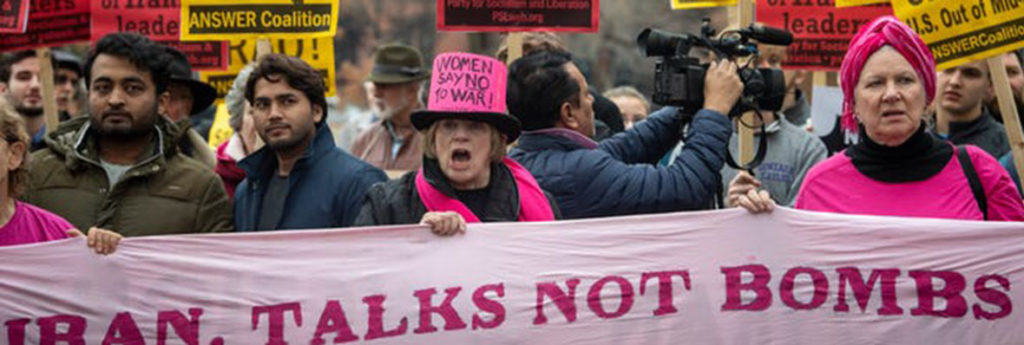Demonstrators in dozens of cities around the US gathered Saturday to protest the Trump administration’s killing of an Iranian general and decision to send thousands of additional soldiers to the Middle East. From Tampa to Philadelphia and San Francisco to New York, protesters carried signs and chanted anti-war slogans.
More than 70 planned protests were organized by CODEPINK and Act Now to Stop War and End Racism, a US-based anti-war coalition, along with other groups.
Donald Trump ordered Friday’s airstrike near Baghdad’s international airport that killed Gen. Qassem Soleimani, the head of Iran’s elite Quds Force who has been blamed for attacks on US troops and American allies going back decades. Iran has vowed retribution, raising fears of an all-out war, but it’s unclear how or when a response might come.
Protest organizers said the Trump administration has essentially started a war with Iran by assassinating Soleimani.
In Miami, nearly 50 protesters gathered. Drivers heard people shouting, “No more drone murders,” “We want peace now” and “What do we want? Peace in Iran.”
A few hundred demonstrators gathered in Times Square on Saturday chanting “No justice, no peace, US out of the Middle East!”
“The United States is trying to use Iraq as a proxy war,” said Russell Branca, 72, of Queens. “If the United States and Iran are going to fights it’s not going to be in the United States and it’s not going to be in Iran, it’ll be in other places. And it’s just crazy because none of this is necessary.”
Iraq votes to expel foreign military
Meanwhile, Iraq’s parliament voted in favour of a resolution calling for an end of the foreign military presence in their nation, an effort aimed at expelling the 5,000 US troops stationed there over the war against the Islamic State group.
Asked shortly before the parliamentary vote whether the US would comply with an Iraqi government request for American troops to leave, US Secretary of State Mike Pompeo would not answer directly, saying the US was watching the situation.
Crisis escalates
Soleimani’s killing has escalated the crisis between Tehran and Washington after months of trading attacks and threats that have put the wider Middle East on edge. The conflict is rooted in Trump pulling out of Iran’s atomic accord and imposing sanctions that have crippled Iran’s economy.
Iran has promised “harsh revenge” for the US attack, which shocked Iranians across all political lines. Many saw Soleimani as a pillar of the Islamic Republic at a moment when it is beset by US sanctions and recent anti-government protests.
Late Saturday, a series of rockets launched in Baghdad fell inside or near the Green Zone, which houses government offices and foreign embassies, including the US Embassy.
Targeting cultural sites
Trump wrote on Twitter afterward that the US had already “targeted 52 Iranian sites (representing the 52 American hostages taken by Iran many years ago), some at a very high level & important to Iran & the Iranian culture.”
Trump did not identify the targets but added that they would be “HIT VERY FAST AND VERY HARD.”
“They’re allowed to kill our people. They’re allowed to torture and maim our people. they’re allowed to use roadside bombs and blow up our people. And we’re not allowed to touch their cultural sites? It doesn’t work that way,” Trump told reporters aboard Air Force One as he returned to Washington from a holiday stay at his Florida estate.
In fact it does work that way.
The 1954 Hague Convention, of which the US is a party, bars any military from “direct hostilities against cultural property.” However, such sites can be targeted if they have been re-purposed and turned into a legitimate “military objective,” according to the International Committee of the Red Cross.
Iran is home to 24 UNESCO World Heritage sites.
Nuclear deal is off
Iran said Sunday it would no longer abide by any of the limits of its unraveling 2015 nuclear deal with world powers, abandoning the accord’s key provisions that block Tehran from having enough material to build an atomic weapon.
Iran insisted in a state television broadcast it remained open to negotiations with European partners. It also didn’t back off of earlier promises that it wouldn’t seek a nuclear weapon.
The announcement Sunday represents the clearest nuclear proliferation threat yet made by Iran since Trump unilaterally withdrew from the accord in May 2018. It also further raises regional tensions, as Iran’s Israel has promised never to allow Iran to be able to produce an atomic bomb.

